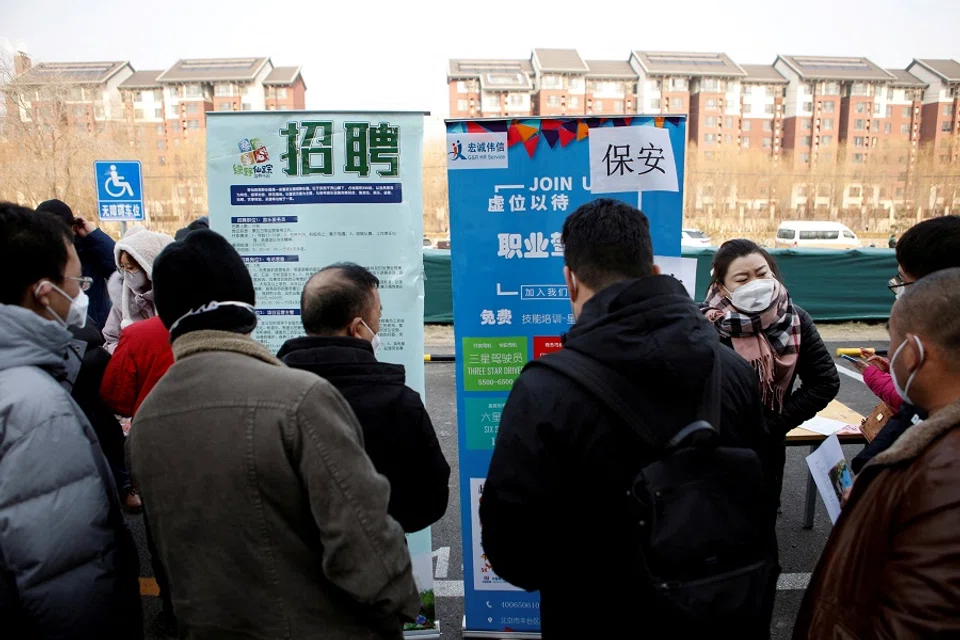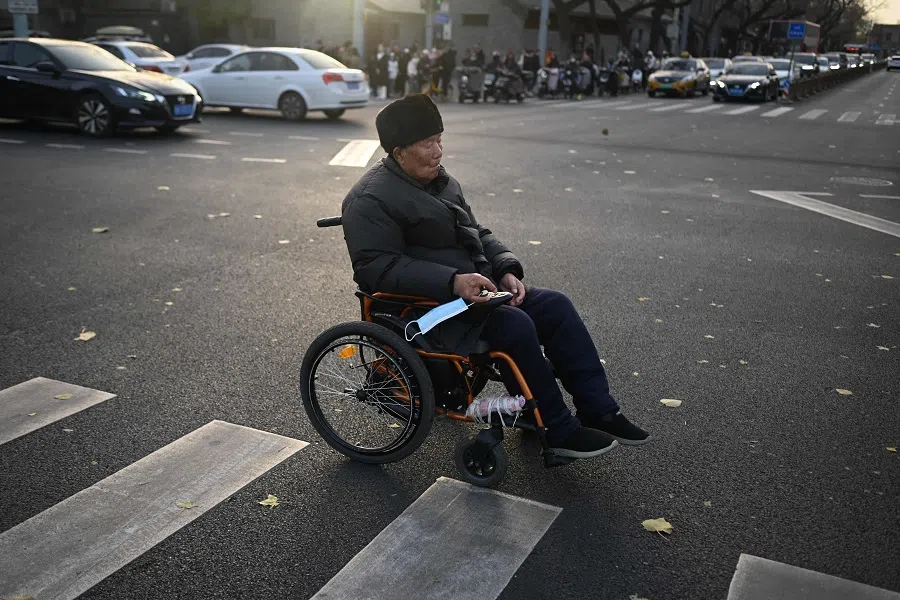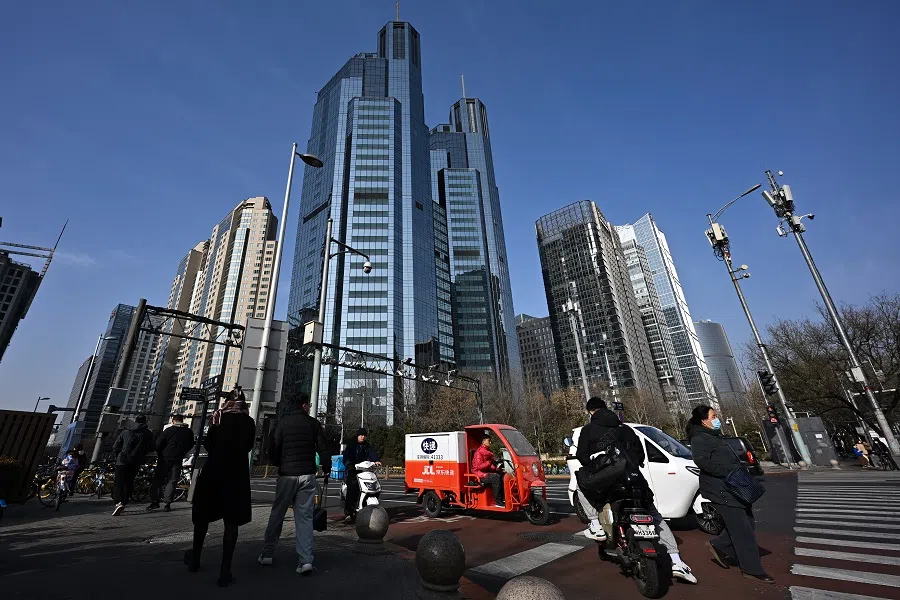China's dismal job market for disabled deepens employment woes
The growing problem facing disabled workers in the Chinese job market has prompted regulators to tighten their grip on the booming affiliation business, but they are also encountering difficulties.

(By Caixin journalists Fan Qiaojia, Tang Hanyu, Tan Chen and Wang Xintong)
In China, a silent crisis is intensifying among disabled people, who face a tougher job market post-pandemic, due to the growth of an underground industry designed to help unscrupulous businesses avoid fines that is making it harder for them to find actual well-paid work.
Long faced with formidable barriers to employment, people with disabilities are now finding even fewer opportunities as many companies, feeling the pinch of China's shaky post-pandemic economic recovery, are taking measures such as downsizing hiring to save costs.
Amid the gathering desperation, a clandestine market is growing in which some rent out their disability certificates through middlemen to companies that do not want to hire the number of disabled workers mandated by the government. China has a quota system that requires employers to reserve at least 1.5% of their positions for people with disabilities or face hefty fines.
By participating in this trade, the disabled people are ostensibly affiliated with these companies without having to actually work, while they receive social security benefits and a salary - usually the minimum wage by local standards. At the same time, the companies are able to avoid fines.
Such deals may seem like a win-win, but in reality they have created "fake jobs", undercutting the wages that disabled workers deserve and squeezing out those who want opportunities to improve their skills and integrate into society, according to disability advocates.

These problems have worsened despite decades of government efforts to increase employment opportunities for the vulnerable group and ensure that they enjoy the same rights and benefits as regular workers.
'Affiliation' business
China enshrined a quota system for hiring people with disabilities into law in the 1990s, allowing provincial-level governments to set their own quotas, but without stipulating a minimum number or penalties. It was not until 2007 that new regulations clarified the minimum 1.5% employment quota, while specifying that employers who did not meet local quotas would be subject to fines in the form of "employment security funds for the disabled" (残疾人就业保障金), the amount of which depended on the shortfall in hiring and the average local salary.
In 2015, the country further reformed the system by changing one of the two contributing parameters to the average salary within the employer.
The move dealt a heavy blow to businesses paying high salaries. For example, many non-compliant companies in Beijing's tech and finance sectors had to pay fines that were almost five times the previous amount after the 2015 reform, Caixin has learned.
Indeed, it only enhanced concerns companies have about hiring and managing disabled workers. "Companies are most afraid of disabled people defending their rights" because such cases can easily turn from a two-party affair into a multi-party affair, Gu Zhihan, who has a disability and works for an IT company, told Caixin.
In addition, many employers are particularly worried about disabled employees having accidents on their way to work, which are usually considered work-related injuries thus requiring the employer to pay varying degrees of compensation, Gu said.

Sensing the business opportunity behind these concerns, employment agencies specialising in helping companies bypass regulations have sprung up since 2015.
A Beijing-based firm called Yisheng Wuyou was one of the first to engage in the "affiliation" business, and in just a few years it has grown into an industry giant. At one point, Yisheng Wuyou supplied disabled workers to most of China's biggest companies, including Meituan and JD.com, to help them meet their quotas, Yisheng's former sales director Pan Qihe told Caixin.
These companies paid social security contributions and salaries - usually the local minimum wage - for these workers and paid a monthly service fee of 1,500 RMB (US$210) per worker to Yisheng, which was responsible for selecting, hiring, placing and managing disabled workers, as well as assuming certain risks in hiring them, Pan said. This approach allowed non-compliant businesses to save up to 70% of what they would otherwise have to pay.
... several former Yisheng employees told Caixin most of the disabled people helped by the company were only given token positions, while their wages have long been withheld, with most of the money taken by company executives.
In the wake of Yisheng's success, many more companies have ventured into the business, including employment agencies and human resources firms such as industry giants FESCO Ltd. and Zhaopin Ltd.
In Beijing alone, hundreds of human resources companies have been engaged in the affiliation business since 2018, hoping to increase revenue while improving competitiveness, a person who runs a human resources firm in the capital told Caixin.

The industry has received another boost over the past two years as some previously compliant companies have turned to employment service providers for the cost-saving method amid operational pressures, Caixin has learned.
Complete industrial chain
The industry's growth has helped more disabled people find jobs, Yisheng Wuyou's president Zhou Min said, citing data that showed the number of disabled people hired by companies in Beijing's Chaoyang district grew by about 50% from 2016 to 2018.
However, several former Yisheng employees told Caixin most of the disabled people helped by the company were only given token positions, while their wages have long been withheld, with most of the money taken by company executives.
In reality, the percentage of disabled people who get "real jobs" through employment agencies is minuscule, and the industry is very chaotic, according to several people familiar with the matter.
There is a complete industrial chain linking employers, disabled job seekers and agents of different sizes. Smaller agents include blind massage parlour owners and others who have access to information about people with disabilities through various channels. They sell this information to larger agents.
A common practice, the Henan man said, is for agents to ask disabled workers to hand over their bank cards and passwords so that they can take most of the workers' wages from their bank accounts each month and then transfer the remainder to the workers via WeChat.
Regardless of the size of the agent's business, it is commonplace for them to dock the wages of disabled workers. During an unannounced visit by Caixin reporters, a Henan province-based agent admitted that he had deducted most of the monthly wages of disabled people who passed through his hands, leaving them with only 600 RMB or 700 RMB.
A common practice, the Henan man said, is for agents to ask disabled workers to hand over their bank cards and passwords so that they can take most of the workers' wages from their bank accounts each month and then transfer the remainder to the workers via WeChat.

The average amount deducted each month has increased from 500 to 600 RMB a few years ago to about 1,000 RMB now, Caixin has learned. In some cases, agents have asked disabled job seekers to pay as much as 30,000 RMB for their services in exchange for attaching themselves to a company for up to five years, during which time they receive their full pay.
In addition, to reduce the risk of getting caught, companies often require employees with disabilities to sign a resignation letter with the date left blank when signing their labour contracts, so they can easily disassociate themselves from these workers when regulators find something wrong, the Henan agent said.
Regulatory dilemma
The growing problem facing disabled workers in the job market has prompted regulators to tighten their grip on the booming affiliation business, but they're also encountering difficulties.
Since the second half of 2019, local branches of the China Disabled Persons' Federation (CDPF) - which is the national organisation responsible for promoting the employment of disabled people - have stepped up checks on how companies hire such workers.
However, due to their reliance on cooperation with agents and lack of enforcement powers, they have had difficulty putting checks in place, Zhou said.
CDPF and its local branches do not have enough staff and therefore have to work with agents to provide employment services for the disabled, he explained.
Chinese law does not have a clear definition of "false employment", so hiring an employee but not placing them in a job is usually not considered illegal.

Chinese law does not have a clear definition of "false employment", so hiring an employee but not placing them in a job is usually not considered illegal.
At the same time, many disabled workers have cooperated with employment agencies on their own volition because they need the health insurance benefits that come with a steady job.
Beijing-based blind masseur Xia Xiaochun earns between 2,000 RMB and 5,000 RMB a month. Years ago, he paid 20,000 RMB through an acquaintance to an agent in exchange for a two-year attachment with a company. He told Caixin he did so because he wanted social insurance, which would give him the money to pay for medical expenses if needed.
'False employment'
Such work can only bring in a little symbolic income for the disabled, but it does not allow them to truly participate in society, nor does it improve their abilities or change their social roles, Li Hong, director-general of a family support centre for the mentally handicapped in Beijing's Haidian district, told Caixin.
She asked, "If this form of work is also considered employment, what is the difference between that and the government giving out an extra basic living allowance?"
Meanwhile, many disabled job seekers who are capable of filling corporate positions remain unemployed because their positions are taken by those just looking for affiliation, a person who helps disabled people find jobs told Caixin.

The positions currently open to disabled job seekers do not meet demand, and the crux of the problem lies in the "lack of effective means to open up the demand for enterprises to accept disabled people for employment," said Li Junfeng, director of the Beijing Geng Fundation.
Yang Lixiong, deputy director of Renmin University of China's disability institute, agreed, saying China has nearly ten million disabled people of working age, half of whom are capable of working. However, it is estimated that fewer than 1 million "real jobs" are now available to them, said disability advocate Fu Gaoshan.
This runs counter to the central government's efforts. In 2021, the State Council, China's cabinet, announced a five-year plan aimed at achieving fuller, higher-quality employment for the group in order to close the "wide gap" between the per capita incomes of households with at least one disabled member and the social average. In 2022, the State Council set a goal of helping 1 million disabled people find jobs in the following three years.
Li Congxun contributed to the story.
This article was first published by Caixin Global as "In Depth: China's 'No-Show' Jobs Market for Disabled Deepens Employment Woes". Caixin Global is one of the most respected sources for macroeconomic, financial and business news and information about China.





